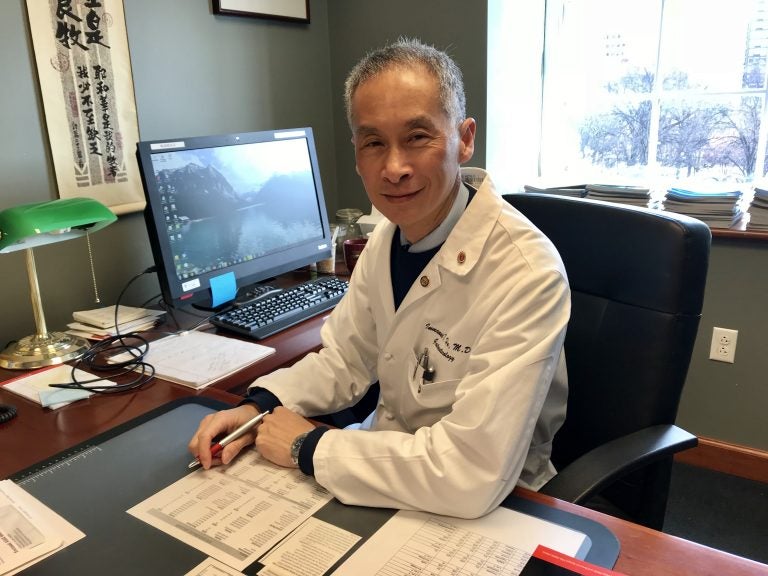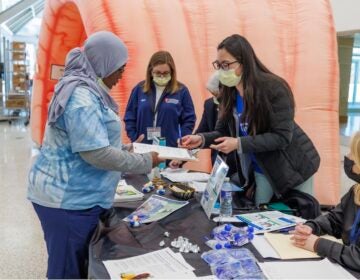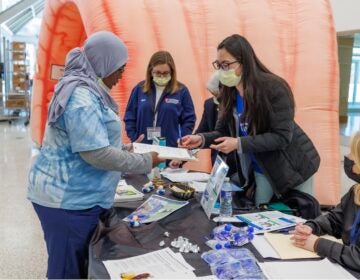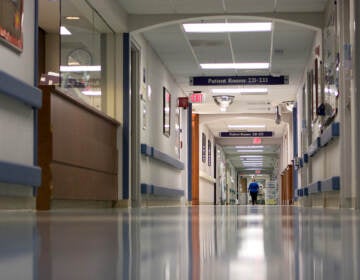A quick tutorial on colonoscopies and how they prevent colon cancer
Dr. Immanuel Ho explains what’s involved in a colonoscopy and how finding a polyp early can mean catching it before it becomes cancerous.
Listen 5:38
Dr. Immanuel K. Ho, MD, Director of Interventional Endoscopy, in his office at Pennsylvania Hospital. (Jennifer Lynn/WHYY)
Colon cancer is one of the most avoidable types of cancer when you get a screening and catch polyps before they become cancerous.
March is National Colorectal Cancer Awareness Month, a time for some of us to consider getting a colonoscopy, a procedure that’s the gold standard to screen for and prevent colon cancer.
I recently spoke with the Director of Interventional Endoscopy at Pennsylvania Hospital, Dr. Immanuel Ho, about screening and prevention.
We started with a quick anatomy lesson.
—
If you envision the digestive system as a long tube that spans from your esophagus to your bottom, the bottom part of that tube or your large intestine is the colon. And that’s the organ that we’re talking about.
Is it susceptible to cancer in particular? I mean the statistic is that colon cancer is the second leading cause of cancer-related deaths in the U.S.
And that’s absolutely right. There are number of factors that we know some of them are diet related, smoking, a lifestyle that takes in higher calories are risk factors for colorectal cancer. But above all in this country it is important to recognize that you have about a 1 in 23 chance of getting colon cancer. That translates to about four to five percent risk. If you can envision the number of people that will die from colon cancer this year can fill more than Citizens Bank Park.
What is colon cancer?
Colorectal cancer comes from colon polyps. And if you can detect the polyp before the cancer has develop then you successfully prevent cancer from forming.
So getting a colonoscopy is one way to detect colorectal cancer and prevent it. What else can you do? I’ve seen those test kits that you can send out in the mail. Are they any good?
The fecal chemical testing or FIT is a very very good test for detecting colorectal cancer. However it is not as good as detecting the precursor lesion which is the polyp that might go on and become colorectal cancer. But getting the FIT test done is important especially if you are on the fence about doing cancer screening by colonoscopy or by any other means. It’s inexpensive. It’s easy. It’s a little bit of poop an examination of that and you’ll get an answer. Any test is better than no test.
I have had several colonoscopies so I know a decent amount about them but for those who haven’t had one let’s go through some basics.
Most important people don’t realize this is the preparation for that colonoscopy. In general, we require a clear liquid diet on the day before and we ask our patients to start doing that bow preparation solution usually late in the afternoon and later on in the evening in split doses.
So people are drinking a lot of this liquid it’s a concoction to flush out your system. What happens when people back out at that stage?
I would really suggest that at that point please contact your doctor because they may give you advice about how to continue preparation in a more comfortable manner. They may give you another preparation substitute. So it’s really important just to communicate with the person who is doing your colonoscopy.
Can a colonoscopy miss something?
Colonoscopy is the gold standard. It is not a perfect tool. Colonoscopy is operator dependent. It’s also dependent on the preparation too and how clean the colon is. There are multiple factors that can impact whether a small polyp could be missed or not.
How safe is the procedure?
Any kind of invasive procedure are associated with a small degree of complications. In the world of colonoscopy, the chances of having some injury or adverse event is rather low.
Who should get a colonoscopy and when?
If you are of average risk that means that you do not have any family history of colorectal cancer or any high risk conditions the age to begin colorectal cancer is 45. There are subgroups that are at higher risk especially African-Americans and they have a higher mortality associated with colorectal cancer and when diagnosed African-Americans tend to have a more advanced stage than non African-Americans. It is very important for this particular segment of our population to get screened.
When’s your next screening?
For myself personally will be within the next five to 10 years. My next screening procedure will be in a few minutes. I will be helping another patient to undergo colorectal cancer screening.
—
Dr. Immanuel Ho is a gastroenterologist and the Director of Interventional Endoscopy at Pennsylvania Hospital.
WHYY is your source for fact-based, in-depth journalism and information. As a nonprofit organization, we rely on financial support from readers like you. Please give today.





